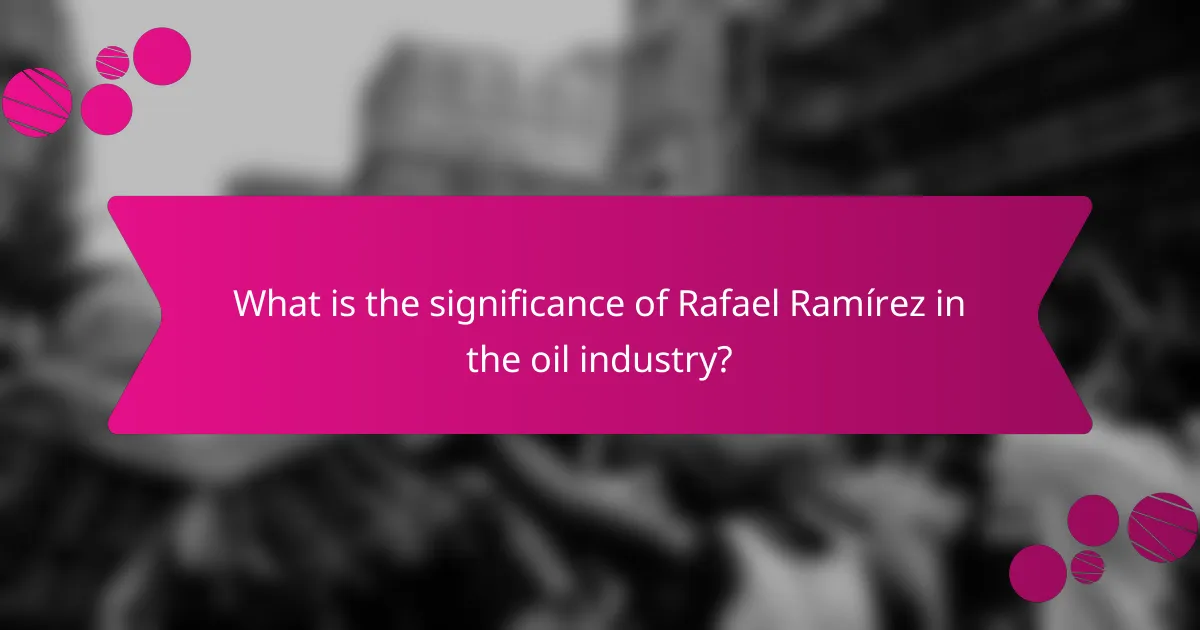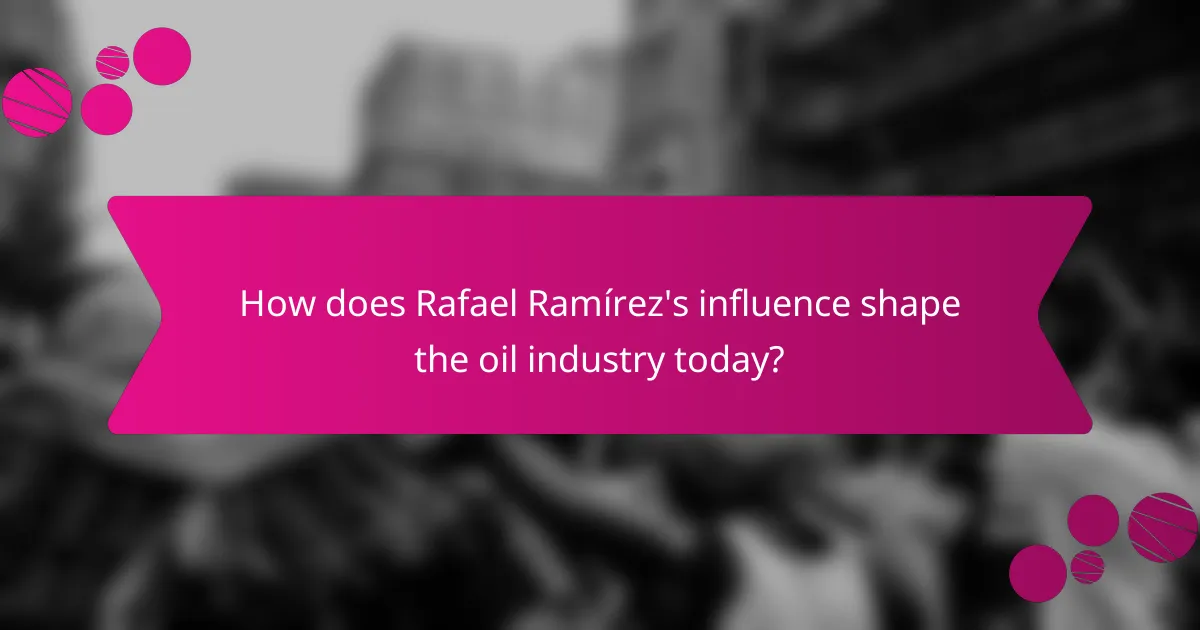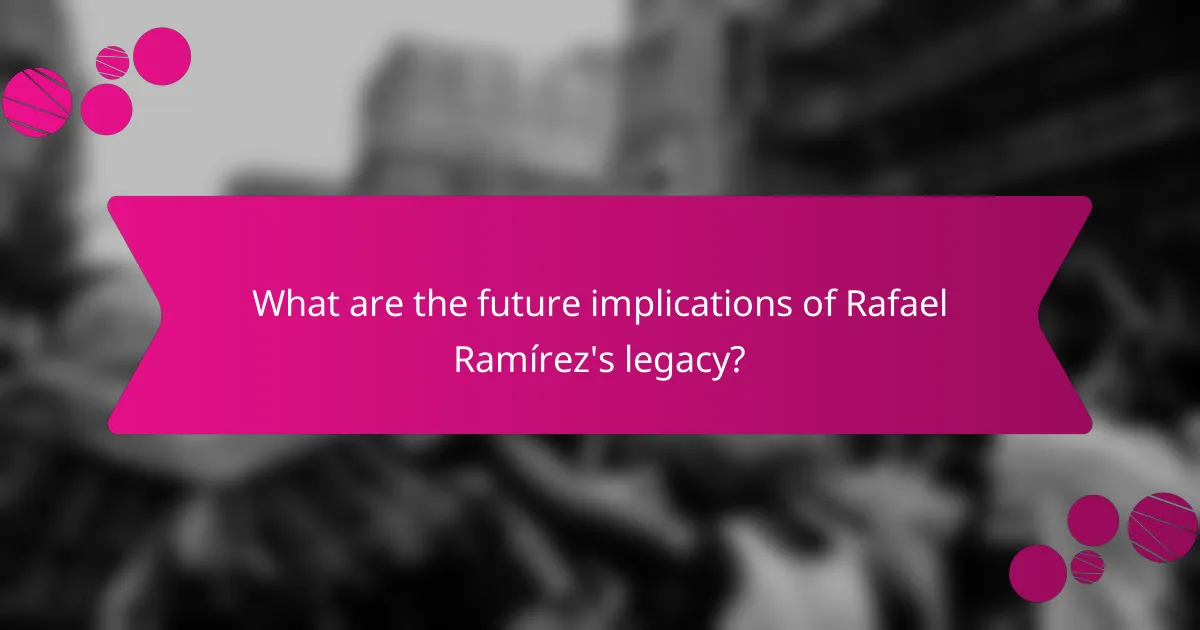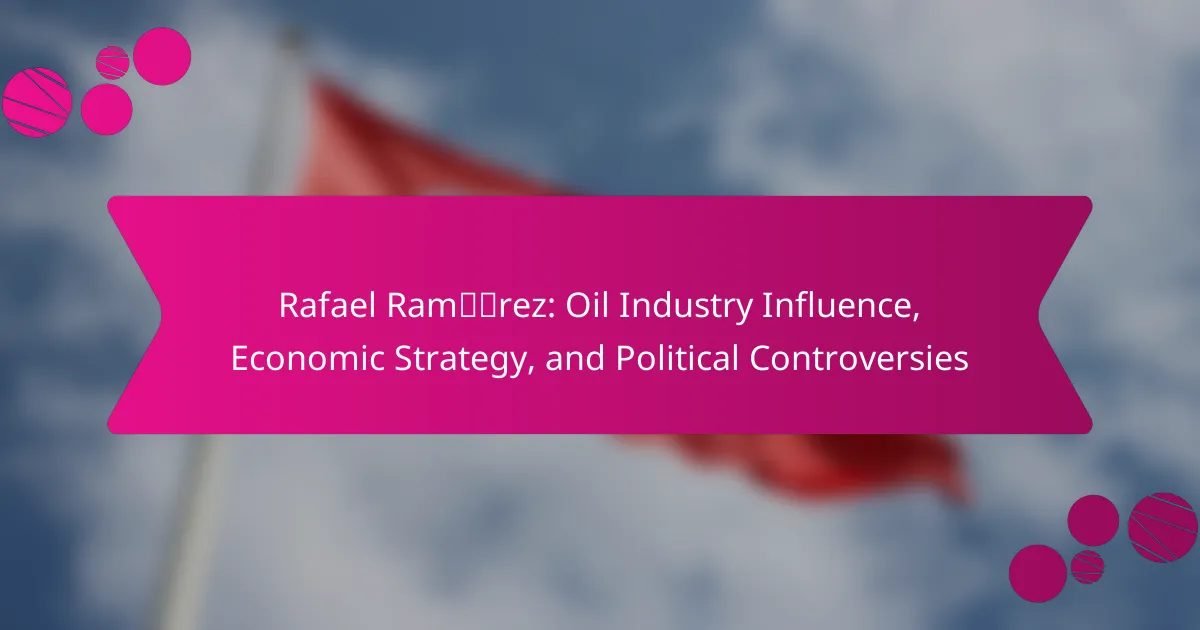
What is the significance of Rafael Ramírez in the oil industry?
Rafael Ramírez is significant in the oil industry due to his role as the former president of Petróleos de Venezuela, S.A. (PDVSA). He served from 2004 to 2013, overseeing major developments in Venezuela’s oil sector. Under his leadership, Venezuela’s oil production increased significantly. Ramírez was instrumental in negotiating oil agreements with various countries. He promoted the idea of oil as a tool for political influence in Latin America. His tenure was marked by a focus on nationalization and state control of oil resources. Ramírez’s policies aimed to enhance Venezuela’s economic stability through oil revenue. His influence extended beyond economics, affecting regional geopolitics.
How did Rafael Ramírez rise to prominence in the oil sector?
Rafael Ramírez rose to prominence in the oil sector through strategic leadership roles in Venezuela’s state-owned oil company, PDVSA. He served as the president of PDVSA from 2004 to 2014. Under his leadership, PDVSA expanded its operations and increased oil production significantly. Ramírez also played a key role in international oil negotiations, enhancing Venezuela’s influence in OPEC. His tenure coincided with high oil prices, which bolstered the company’s revenues. Additionally, he implemented policies that aligned with the Venezuelan government’s socialist agenda. These actions solidified his position as a powerful figure in the oil industry. Ramírez’s prominence was further amplified by his close ties to the political leadership of Venezuela.
What roles has Rafael Ramírez held in the oil industry?
Rafael Ramírez has held multiple significant roles in the oil industry. He served as the Minister of Petroleum and Mining in Venezuela from 2002 to 2013. During this time, he was also the President of Petróleos de Venezuela, S.A. (PDVSA). His leadership at PDVSA was marked by a focus on increasing oil production. Ramírez played a key role in shaping Venezuela’s oil policies and international relations. He was influential in negotiating oil contracts with foreign companies. Additionally, he served as Venezuela’s representative to the Organization of the Petroleum Exporting Countries (OPEC). Ramírez’s tenure in these roles significantly impacted the Venezuelan economy and oil sector.
What achievements are attributed to Rafael Ramírez in this field?
Rafael Ramírez is recognized for significant achievements in the oil industry and economic strategy. He served as the Minister of Oil and Mining in Venezuela from 2002 to 2013. Under his leadership, Venezuela’s oil production increased substantially. He was instrumental in the nationalization of the oil industry, which aimed to reclaim control from foreign companies. Ramírez also played a key role in establishing the Petrocaribe initiative, which provided oil to Caribbean nations on favorable terms. His tenure saw Venezuela become a major player in OPEC. He advocated for energy sovereignty and regional integration. Ramírez’s policies had lasting impacts on Venezuela’s economy and foreign relations.
What impact has Rafael Ramírez had on economic strategies?
Rafael Ramírez has significantly influenced economic strategies in Venezuela. He served as the Minister of Energy and Petroleum and later as the President of PDVSA. His tenure saw a focus on increasing state control over oil resources. Ramírez implemented policies that aimed to maximize oil revenues for national development. He prioritized investments in social programs funded by oil profits. Under his leadership, Venezuela’s oil production capacity expanded. This expansion was critical for the country’s economy, especially during periods of high oil prices. Ramírez’s strategies also faced criticism for leading to inefficiencies and corruption within the oil sector. Overall, his impact on economic strategies was profound, shaping Venezuela’s approach to its oil wealth.
How has Rafael Ramírez influenced Venezuela’s economic policies?
Rafael Ramírez has significantly influenced Venezuela’s economic policies through his leadership in the oil sector. As the Minister of Petroleum and Mining, he promoted state control over oil resources. This approach aimed to maximize revenue for social programs. Ramírez’s tenure saw the implementation of policies that increased oil production. He advocated for OPEC’s role in stabilizing oil prices, benefiting Venezuela’s economy. His focus on nationalization of foreign oil companies solidified state dominance in the sector. Additionally, Ramírez emphasized investment in social programs funded by oil revenues. His strategies shaped the economic landscape during his time in office, impacting both domestic and international economic relations.
What economic strategies did Rafael Ramírez advocate for during his tenure?
Rafael Ramírez advocated for state control of the oil industry during his tenure. He emphasized the importance of nationalizing oil resources to ensure economic sovereignty. Ramírez promoted increased investment in the oil sector to boost production and revenues. He also supported the diversification of the economy beyond oil dependency. His strategies included enhancing social programs funded by oil revenues. Ramírez aimed to strengthen the state-owned oil company, PDVSA, to maximize profits. He argued that oil wealth should benefit the Venezuelan population directly. His policies led to significant increases in oil production and government income during his time in office.
What political controversies surround Rafael Ramírez?
Rafael Ramírez is surrounded by political controversies primarily related to his tenure as the Minister of Oil in Venezuela. He faced accusations of corruption and mismanagement during his leadership at Petróleos de Venezuela, S.A. (PDVSA). Critics allege that he oversaw significant financial losses in the state-owned oil company. Additionally, Ramírez has been implicated in disputes regarding the allocation of oil revenues. His political alignment with former President Hugo Chávez has also fueled controversy. Disagreements with current political figures have led to further scrutiny of his actions and policies. These controversies have sparked debates about transparency and accountability in Venezuela’s oil sector.
What are the key controversies involving Rafael Ramírez and government policies?
Rafael Ramírez has been involved in several key controversies regarding government policies. His tenure as the Minister of Oil and President of PDVSA faced scrutiny over alleged mismanagement of Venezuela’s oil resources. Critics claim that his policies contributed to the decline of oil production and revenue. Ramírez has been accused of prioritizing political loyalty over technical expertise in appointments. Additionally, his role in the government’s economic strategies drew criticism for exacerbating inflation and economic instability. These controversies have sparked debates about the impact of his leadership on Venezuela’s economy and the oil sector.
How have these controversies affected his reputation and career?
Rafael Ramírez’s controversies have significantly damaged his reputation and career. His involvement in allegations of corruption has led to public distrust. This distrust has hindered his ability to operate effectively within the oil industry. Additionally, political backlash has resulted in diminished influence among peers. Ramírez’s career trajectory has been adversely impacted, with reduced opportunities for leadership roles. The controversies have also sparked investigations, further complicating his professional standing. Overall, these factors have collectively undermined his legacy in the oil sector.

How does Rafael Ramírez’s influence shape the oil industry today?
Rafael Ramírez significantly influences the oil industry today through his policies and leadership. He served as the Minister of Energy and president of the state oil company, PDVSA. Under his tenure, he emphasized nationalization and state control over oil resources. His strategies aimed to increase Venezuela’s oil production and revenues. Ramírez’s focus on social programs funded by oil profits has shaped economic policies. His legacy includes both support for increased state investment and criticism for mismanagement. The oil industry remains central to Venezuela’s economy, reflecting his long-term impact. His influence is evident in ongoing debates about oil governance and economic strategy.
What current trends in the oil industry reflect Rafael Ramírez’s strategies?
Current trends in the oil industry reflecting Rafael Ramírez’s strategies include increased state control and investment in oil production. Under Ramírez’s leadership, there was a push for nationalization of oil resources. This strategy aligns with the trend of governments seeking to maximize revenue from oil exports. Additionally, there is a focus on sustainable practices within the industry. Ramírez emphasized the importance of balancing economic growth with environmental responsibility. The global shift towards renewable energy sources also mirrors his advocacy for diversification in energy portfolios. These trends highlight the ongoing influence of his policies in shaping the oil sector’s direction.
How are Rafael Ramírez’s policies still relevant in today’s market?
Rafael Ramírez’s policies remain relevant today due to their impact on the oil market and economic strategies. His emphasis on state control of oil resources shaped current industry regulations. Ramírez advocated for nationalization, which influenced how countries manage their natural resources. His policies promoted investment in infrastructure, affecting current energy projects. Additionally, his focus on social programs continues to resonate in discussions about economic equity. These elements reflect ongoing debates about resource management and economic policy. The global shift towards energy independence also ties back to his strategies. Ramírez’s legacy informs current discussions on sustainable practices in the oil sector.
What lessons can be learned from Rafael Ramírez’s career?
Rafael Ramírez’s career offers valuable lessons in leadership and strategic decision-making. His tenure as Venezuela’s oil minister emphasized the importance of leveraging national resources for economic growth. Ramírez demonstrated how effective management of an industry can influence a country’s global standing. He also highlighted the risks of political involvement in economic sectors. His career shows that balancing economic strategy with political realities is crucial for sustainable development. Additionally, Ramírez’s controversies remind us of the potential consequences of governance decisions on public trust. Overall, his experiences provide insights into the complexities of managing national resources amid political challenges.
What best practices can be derived from Rafael Ramírez’s approach to the oil industry?
Rafael Ramírez’s approach to the oil industry emphasizes strategic state control and investment in infrastructure. He advocated for the nationalization of oil resources to ensure that profits benefit the country. This model promotes transparency and accountability within the sector. Ramírez also focused on diversifying energy sources, reducing dependency on oil. His emphasis on international partnerships helped to enhance technology transfer and expertise. Additionally, he prioritized environmental sustainability in oil production practices. These best practices can lead to a more resilient and equitable oil industry.

What are the future implications of Rafael Ramírez’s legacy?
Rafael Ramírez’s legacy will significantly impact Venezuela’s oil industry and economic policies. His tenure as Minister of Oil established a strong state control over oil resources. Future implications include ongoing debates about nationalization versus privatization in the oil sector. His policies may influence future leaders’ approaches to managing oil revenues. Additionally, Ramírez’s controversial political strategies could shape Venezuela’s governance and international relations. The economic strategies he implemented will likely affect future economic recovery efforts. His legacy serves as a reference point for discussions on energy independence in Latin America. These factors collectively contribute to the evolving narrative of Venezuela’s oil-dependent economy.
How might Rafael Ramírez’s influence evolve in the coming years?
Rafael Ramírez’s influence may evolve significantly due to his experience in the oil industry and political landscape. His past role as Venezuela’s oil minister gives him substantial knowledge and connections. As global energy demands shift, Ramírez may adapt his strategies to align with new market trends. Additionally, his political affiliations could impact his ability to influence economic policies. The ongoing economic challenges in Venezuela may also provide him opportunities to propose reforms. Historical trends show that leaders with industry expertise often regain influence during economic crises. Thus, Ramírez’s background positions him to potentially reshape energy policies in response to evolving global dynamics.
What potential shifts in the oil industry could arise from his legacy?
Rafael Ramírez’s legacy could lead to significant shifts in the oil industry, particularly in nationalization and regulatory frameworks. His tenure emphasized state control over oil resources, which may inspire other nations to adopt similar strategies. This could result in increased government involvement in oil production and pricing. Furthermore, Ramírez’s focus on energy sovereignty could shift global investment patterns. Countries might prioritize domestic oil industries over foreign partnerships. Additionally, his legacy could influence environmental policies within the oil sector. A greater emphasis on sustainability may emerge as nations respond to climate change pressures. These shifts could reshape global oil markets and alter geopolitical dynamics.
What practical insights can be gained from studying Rafael Ramírez’s career?
Studying Rafael Ramírez’s career provides insights into the dynamics of the oil industry and economic policy. His tenure as Venezuela’s Minister of Energy and Petroleum highlights strategic decision-making in resource management. Ramírez’s role in nationalizing oil assets illustrates the impact of government control on economic outcomes. Analyzing his leadership reveals the balance between political influence and industry demands. His controversies emphasize the importance of transparency and accountability in public office. Ramírez’s experience underscores the complexities of navigating international relations in the energy sector. Understanding his career offers lessons on the intersection of politics and economics in resource-rich countries.
Rafael Ramírez is a prominent figure in the oil industry, known for his significant roles as the former president of Petróleos de Venezuela, S.A. (PDVSA) and Minister of Petroleum and Mining. His leadership from 2004 to 2013 was marked by increased oil production, nationalization efforts, and a focus on using oil as a political tool in Latin America. The article examines Ramírez’s rise to prominence, key achievements, economic strategies, and the political controversies surrounding his tenure, highlighting his lasting influence on Venezuela’s oil sector and economic policies. Additionally, it explores the implications of his legacy and potential shifts in the industry resulting from his approach to resource management.
